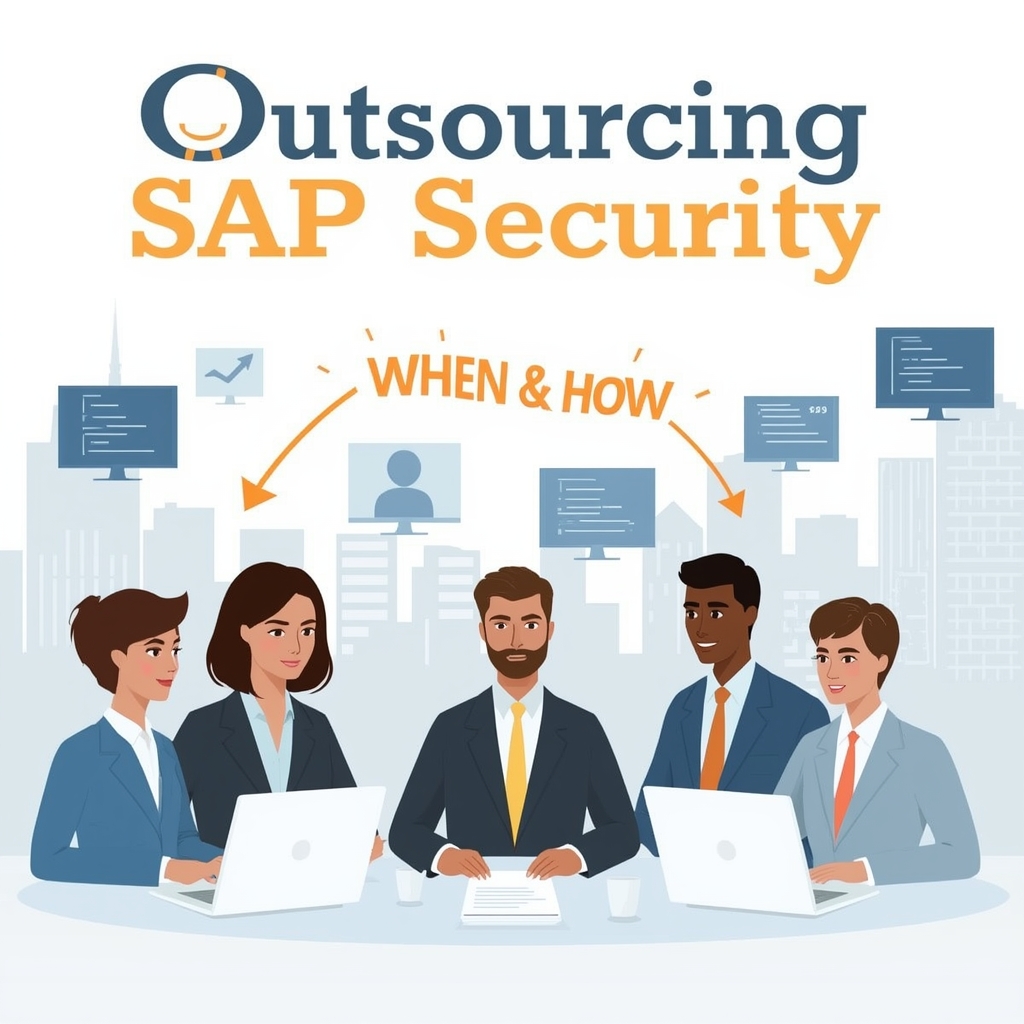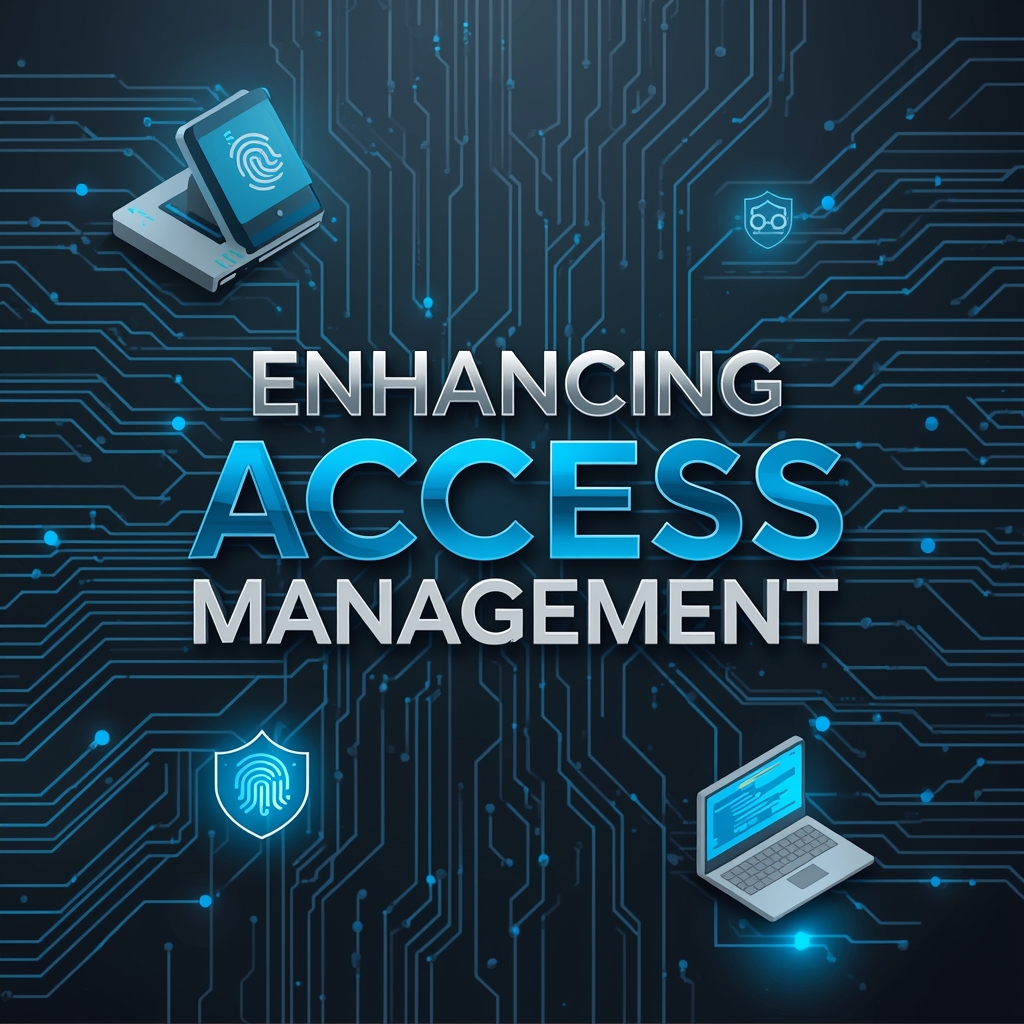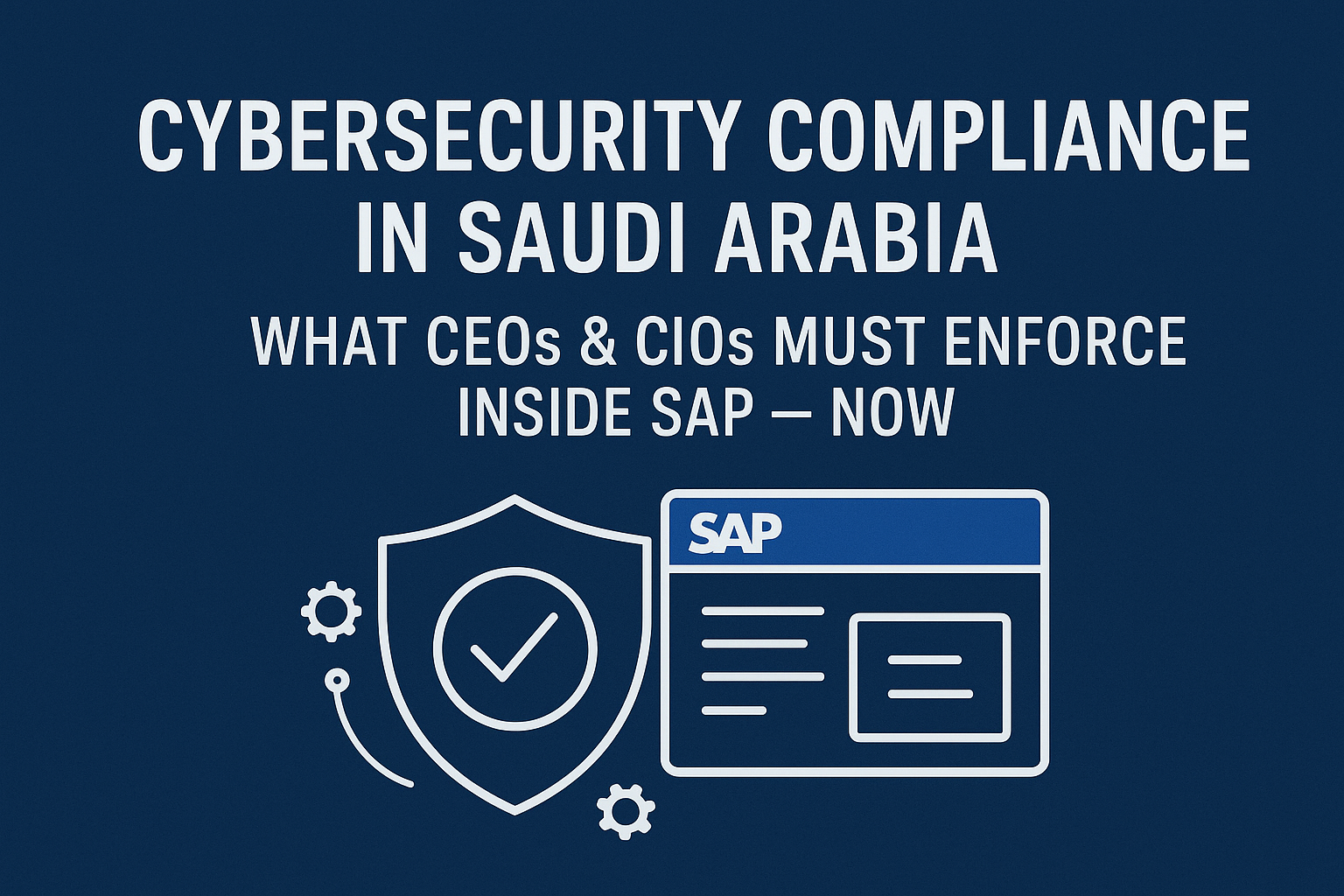Business leaders today face continuous change as technology reshapes how we live and work. SAP systems often stand as the backbone of organizations—integrating everything from supply chains to finance departments. Protecting these critical systems becomes a priority for any business hoping to operate securely and efficiently. Companies must ensure that their SAP environments remain not only secure, but also compliant with an array of regulations. In this complex environment, outsourcing SAP security often represents the smartest path to maximize value, minimize risks and free up valuable internal resources for strategic initiatives.
The growing importance of SAP security
Securing SAP systems is far from a technical concern alone. SAP touches processes that drive revenue and manage sensitive employee and customer data. Any breach or unauthorized change within these platforms can have severe consequences. Businesses can face regulatory penalties, reputational damage, stalled operations or financial losses. As a result, SAP security now sits at the intersection of IT operations, compliance functions and business strategy.
New forms of cyber threats target organizations daily. Sophisticated attackers often exploit overlooked vulnerabilities in configuration, user access or outdated authorizations. At the same time, regulations—such as the General Data Protection Regulation (GDPR), Sarbanes-Oxley (SOX), and ISO 27001—demand a structured approach to authorization management and auditability. Finding the right blend of robust security and uncompromising business continuity remains a delicate balance for many companies.
When does outsourcing SAP security make sense?
Every business will encounter a moment when internal SAP security and role administration pose challenges that become difficult or unwise to resolve in-house. Recognizing this moment can offer a powerful competitive advantage. Organizations traditionally attempt to build in-house SAP security teams. However, several circumstances suggest it is time to evaluate external expertise.
1. Skills gaps and specialist shortages
Businesses often struggle to attract and retain specialized SAP security professionals. Even when an organization recruits skilled staff, the fast-paced world of compliance standards, new vulnerabilities and advanced cyber threats can quickly expose knowledge gaps. Outsourcing brings access to teams whose sole function is to remain ahead of these changes, possess deep technical know-how and provide guidance at every step.
2. Seasonal peaks and resource shortages
Many companies experience times of year when demand for SAP security and role management spikes. Regulatory audits, large-scale system migrations or significant business changes can outpace the capabilities of small internal teams. Outsourced partners can quickly scale their resources to meet these demands, ensuring compliance and continuity during high-pressure months.
3. Compliance pressure and regulatory changes
Regulations like GDPR, SOX and various industry-specific requirements regularly evolve. Companies that fail to keep pace risk audit failures or enforcement actions. Outsourced SAP security experts offer ongoing monitoring, timely updates and proactive recommendations that help future-proof systems against ever-shifting statutory requirements.
4. Digital transformation and S/4HANA migrations
The migration from legacy SAP systems to S/4HANA represents a major undertaking. Missteps in authorization design can slow down or derail projects of this magnitude. Outsourcing SAP Authorization Managed Services Small-Market, Mid-Market or Enterprise-Market means organizations can lean on proven frameworks, tested automation and hands-on guidance to navigate the transition confidently.
The business value of outsourcing SAP security
For business executives, outsourcing should not equate to cost-cutting alone. Instead, it serves as a driver for greater efficiency, strategic agility and business performance. SAP security outsourcing can unlock significant benefits at every stage of the enterprise journey.
Cost optimization
Building and maintaining an in-house SAP security function involves hidden costs. Recruiting, training and retaining staff adds up. Regular certification, upskilling and investments in security tooling can strain IT budgets. Outsourcing converts many of these fixed expenditures into predictable, outcome-driven service fees. Whether a small, mid-sized or enterprise organization, this flexibility allows for sharper financial planning.
Improved business focus
When organizations rely on trusted service providers for SAP Authorization Managed Services Small-Market, Mid-Market or Enterprise-Market, internal teams can focus on core objectives. Every minute spent on user access reviews or troubleshooting authorization issues becomes time not spent growing the business or innovating. Outsourced partners assume responsibility for everyday security and compliance tasks, freeing up employee bandwidth for projects that drive long-term value.
Consistent and reliable expertise
Service providers deliver deep, specialized knowledge in both SAP security and industry-specific regulations. For businesses facing new compliance requirements, having access to an expert bench ensures nothing gets missed. High standards remain consistent—even as internal priorities or team members change.
Scalability and adaptability
Market conditions can force companies to scale up or down quickly. Outsourcing SAP security permits organizations to adapt their level of support as needed. Adding new subsidiaries, launching in new geographies or managing a merger becomes much easier when support can ramp up or taper down without adding HR complexity or overhead.
Continuous compliance and audit readiness
Modern businesses find themselves under constant regulatory scrutiny. Outsourced SAP security providers keep systems aligned with requirements for GDPR, SOX, ISO 27001 and other frameworks. They ensure that audit trails, segregation of duties controls and risk analyzes are always complete and up to date. Organizations become audit-ready year-round instead of scrambling before each review.
Key capabilities of managed SAP authorization services
Managed services in SAP authorization span several distinct offerings aimed at businesses of various sizes and needs. Companies should understand these service models to align outsourced solutions with their unique operational goals.
SAP Authorization Managed Services Small-Market
For smaller organizations, SAP Authorization Managed Services Small-Market delivers cost-effective, efficient access management tailored to limited business units or single-country operations. This service typically includes needs assessments, user provisioning, monthly role reviews and ongoing security monitoring. Automated tools streamline processes while regular reporting supports both compliance and operational transparency.
SAP Authorization Managed Services Mid-Market
Mid-sized businesses face greater complexity, operating across geographies or business departments. SAP Authorization Managed Services Mid-Market addresses these needs by providing scalable frameworks, integration with existing IT governance, and support for evolving audit requirements. Providers design solutions in close consultation—often collaborating to refine roles, manage cross-functional segregation of duties, and maintain policy adherence.SAP Authorization Managed Services Enterprise-Market
Large enterprises require robust, high-performance access controls and stringent compliance oversight. SAP Authorization Managed Services Enterprise-Market delivers dedicated teams, advanced analytics, threat intelligence and real-time monitoring. Service providers work alongside client leadership to align security with business transformation, mergers or global expansion projects—ensuring uninterrupted performance and regulatory safeguarding.
How to choose the right outsourcing partner
Selecting a partner for SAP security management demands rigorous evaluation. The best outcomes result when organizations look beyond surface-level expertise and examine cultural fit, strategic alignment and service flexibility.
Look for transparency and proven experience
Potential partners should offer clear methodologies, documented case studies and defined service metrics. Their references must speak to both technical proficiency and collaborative spirit. Requesting demonstrations, pilot projects or sample reports can build trust and demonstrate competency before a long-term commitment.
Ensure compliance fluency and up-to-date certifications
Regulatory standards change quickly. Partners must remain current on all relevant certifications—whether for SAP authorization, GDPR-specific measures, or industry frameworks like SOX and ISO 27001. Ask to see audit results and ongoing accreditation.
Alignment with business goals and responsiveness
Every organization has unique needs. Successful outsourcing depends on an ongoing dialog that adapts services to changing goals. Partners who engage collaboratively, support innovation and remain responsive pave the way for lasting relationships. Choosing providers with local presence and customer-oriented operations can remove language or cultural barriers and accelerate issue resolution.
Transition strategies and common pitfalls
Moving from in-house to outsourced SAP security requires careful planning. Avoiding common pitfalls and taking proactive steps can help ensure the smoothest transition possible. Understanding the journey in advance prepares organizations to maximize business benefits from day one.
Defining roles and responsibilities
Clarity around who handles what is essential. Organizations and outsourcing partners must define accountabilities up front. This includes who maintains policies, how escalations are managed and what service levels are guaranteed. Establishing a well-managed handoff for ongoing tasks, systems access and documentation plays a significant role in risk reduction.
Migrating sensitive data securely
Outsourcing partners often need substantial system access. Transition plans should document secure access protocols, encryption requirements and compliance with privacy obligations. Robust identity verification and multi-factor authentication further limit risks. Companies should require regular reviews and attestation for all privileged access.
Setting up communication and escalation channels
Regular updates keep all stakeholders aligned. Predefined communication channels, status dashboards and project meetings reduce the likelihood of misunderstandings or missed objectives. Organizations should agree upon escalation paths for emergencies—such as detecting suspicious activity, failed access attempts or compliance breaches.
Ensuring business continuity during changeover
Authorizations play a direct role in business availability. Organizations must stage transitions thoughtfully to avoid accidental lockouts, denied transactions, or operational slowdowns. Phased migrations, strong documentation and detailed test plans ensure that business processes continue uninterrupted throughout the outsourcing process.
Addressing common concerns about outsourcing SAP security
Some business leaders question if outsourcing SAP security may result in loss of control, greater risks or unplanned expenses. It is normal to have concerns before embarking on such a fundamental shift. Identifying these worries early helps organizations ask the right questions and set up proper governance.
Balancing control and convenience
Outsourcing does not require businesses to cede control over sensitive operations. Smart service agreements outline the boundaries, review processes and approval hierarchies necessary for oversight. Continuous reporting, transparency and regular steering meetings ensure that decision-makers remain deeply involved.
Ensuring cost predictability
Well-structured contracts spell out in clear terms what services, deliverables and performance metrics are included. Fixed-fee models, regular reporting and defined change processes eliminate hidden costs or surprises. Businesses can pivot quickly by renegotiating scope as company priorities shift.Protecting sensitive information
Partnering with service providers does not translate to greater risk for confidential data. Top-tier providers undergo thorough security audits, maintain certifications and operate under strict non-disclosure agreements. Implementing clear access controls and regular technical testing strengthens the assurance that all data remains uncompromised.
The future landscape of SAP security outsourcing
The world of SAP security outsourcing continues to evolve. As threats grow more sophisticated and regulations multiply, demand for specialized managed services will only increase. Artificial intelligence, machine learning and real-time analytics allow for smarter threat detection and tighter control over authorizations. Service providers serving the Small-Market, Mid-Market or Enterprise-Market segments now leverage collaborative platforms, automation tools and robust monitoring to help businesses operate with peace of mind.
As regulations such as GDPR, SOX, and ISO 27001 become standard expectations worldwide, companies of every size must find practical solutions to address risk and compliance efficiently. Outsourcing SAP Authorization Managed Services provides a pathway to meet these requirements, increase operational agility and keep the focus on core growth opportunities. Embracing this approach means adapting to the new realities of business—not only with greater technical confidence but also with a stronger competitive edge.
Exploring the human factor in SAP security outsourcing
Technology plays a vital role in SAP security, but people remain at the center of every successful partnership. Service providers excel when they invest in developing talent, building transparent relationships and cultivating teamwork. Businesses benefit further when internal stakeholders and outsourcing partners collaborate as if they are one team—sharing knowledge and embracing common goals.
Employing young professionals and students can drive fresh perspectives, faster responses and innovation. This approach often results in solutions that better align with customer needs, lower costs and adapt more quickly to changing circumstances. Clients find value in services that consider the broader organizational context—not just technical requirements.
Global organizations increasingly seek providers who offer support beyond standard working hours, including weekends. Consistent service availability boosts business continuity and operational confidence. As outsourcing models grow more flexible, companies will place higher premiums on providers that deliver not only technical excellence but also genuine partnership and understanding of business realities.





